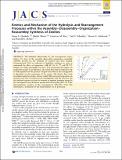Kinetics and mechanism of the hydrolysis and rearrangement processes within the assembly-disassembly-organization-reassembly synthesis of zeolites
Abstract
The hydrolysis (disassembly, D) and rearrangement (organization, O) steps of the assembly-disassembly-organization-reassembly (ADOR) process for the synthesis of zeolites have been studied. Germanium–rich UTL was subjected to hydrolysis conditions in water to understand the effects of temperature (100, 92, 85, 81, 77, and 70 °C). Samples were taken periodically over an 8–37 h period and each sample was analyzed by powder X-ray diffraction. The results show that the hydrolysis step is solely dependent on the presence of liquid water, whereas the rearrangement is dependent on the temperature of the system. The kinetics have been investigated using the Avrami-Erofeev model. With increasing temperature, an increase in rate of reaction for the rearrangement step was observed and the Arrhenius equation was used to ascertain an apparent activation energy for the rearrangement from the kinetic product of the disassembly (IPC-1P) to the thermodynamic product of the rearrangement (IPC-2P). From this information a mechanism for this transformation can be postulated.
Citation
Henkelis , S E , Mazur , M , Rice , C M , Wheatley , P S , Ashbrook , S E & Morris , R E 2019 , ' Kinetics and mechanism of the hydrolysis and rearrangement processes within the assembly-disassembly-organization-reassembly synthesis of zeolites ' , Journal of the American Chemical Society , vol. 141 , no. 10 , pp. 4453-4459 . https://doi.org/10.1021/jacs.9b00643
Publication
Journal of the American Chemical Society
Status
Peer reviewed
ISSN
0002-7863Type
Journal article
Description
The authors would like to thank the EPSRC (grants: EP/K025112/1; EP/K005499/1; EP/K503162/1; EP/N509759/1) for funding opportunities. R.E.M., and M.M. would like to acknowledge OP VVV "Excellent Research Teams", project No. CZ.02.1.01/0.0/0.0/15_003/0000417 - CUCAM. We would like to thank the ERC (Advanced Grant 787073 “ADOR”).Collections
Items in the St Andrews Research Repository are protected by copyright, with all rights reserved, unless otherwise indicated.

